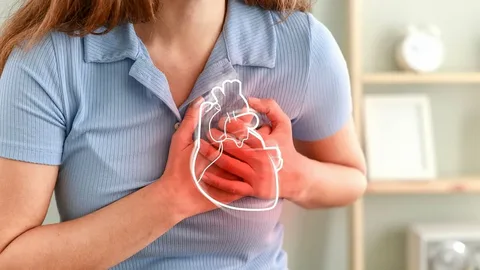Am i having a heart attack female quiz? Heart disease is often seen as a “man’s problem,” but statistics show a different reality. Cardiovascular disease is the leading cause of death among women worldwide, responsible for more fatalities than all forms of cancer combined. One of the most dangerous aspects is that women’s heart attack symptoms are often misdiagnosed, misunderstood, or completely missed—even by healthcare providers.
This article is designed to educate and empower women to recognize the signs of a heart attack through a symptom-based quiz, backed by professional insight and clinical context.

Why Heart Attacks in Women Are Often Missed
Am i having a heart attack female quiz Most people associate heart attacks with sudden, crushing chest pain. However, women often experience more subtle and atypical symptoms, such as fatigue, indigestion, shortness of breath, or jaw pain. These symptoms are frequently mistaken for anxiety, stress, or even menopause.
Several studies, including those from the American Heart Association, have shown that:
- Women under 55 are more likely to be misdiagnosed than men of the same age.
- 1 in 5 women will die within one year of a heart attack.
- Symptoms can begin weeks before a heart attack but may not be taken seriously.
Understanding your risk and learning to recognize these signs can literally save your life.
Common Symptoms of Heart Attacks in Women
The most frequently reported symptoms in women differ significantly from those in men. Here are the key signs:
- Shortness of breath (with or without chest discomfort)
- Unusual fatigue that’s not due to physical exertion
- Jaw, neck, shoulder, upper back, or arm pain
- Nausea, vomiting, or indigestion-like discomfort
- Dizziness or lightheadedness
- Mild chest discomfort or pressure, rather than intense pain
- Cold sweats
Some women report feeling like they’re coming down with the flu, or describe a general sense of unease, without being able to pinpoint the cause.
Am I Having a Heart Attack? – Female Quiz
This quick quiz is designed to help you assess whether your current symptoms may suggest a heart attack. It’s not a diagnostic tool, but it’s a valuable way to check in with your body.
Instructions: Answer “Yes” or “No” to the following 10 questions based on how you feel now or in the past 24 hours.
- Are you experiencing shortness of breath, even while resting or doing minimal activity?
- Do you feel pressure, fullness, squeezing, or tightness in your chest (even if it’s not painful)?
- Have you felt unusual fatigue that seems excessive, sudden, or unexplainable?
- Do you have pain or discomfort in your jaw, neck, shoulders, arms, or upper back?
- Are you experiencing nausea, vomiting, or an upset stomach without a clear cause?
- Have you felt lightheaded, dizzy, or like you might faint?
- Are you sweating more than usual, especially with cold or clammy skin?
- Are these symptoms new or different from what you normally experience?
- Do you have a history of high blood pressure, diabetes, or high cholesterol?
- Do you have a family history of heart disease, stroke, or early cardiac death?
Quiz Scoring and What It Means
- 7–10 “Yes” Answers:
You may be showing signs of a potential heart attack. Seek immediate emergency care. Call 911 or go to the nearest hospital. Time is critical. - 4–6 “Yes” Answers:
You are at risk and should contact your healthcare provider immediately. These could be early warning signs that should not be ignored. - 0–3 “Yes” Answers:
You may not be experiencing a heart attack, but remain vigilant. If symptoms worsen or feel unusual, get checked by a doctor without delay.
When to Seek Emergency Help
Never wait more than 5 minutes if you suspect you are having a heart attack. Even if your symptoms seem mild, get checked. Women often delay treatment because they don’t want to “overreact.”
Call emergency services immediately if:
- Symptoms last longer than 5–10 minutes
- You feel short of breath, dizzy, or faint
- Chest pressure or discomfort is present
- You have a general feeling that “something is wrong”
Remember: Acting fast can save your heart muscle and your life.
Why Prevention Is Crucial
Preventing a heart attack starts long before symptoms appear. Up to 80% of heart disease can be prevented through lifestyle changes and early intervention.
Major Risk Factors for Women:
- Smoking
- Obesity or sedentary lifestyle
- Uncontrolled high blood pressure
- High cholesterol
- Type 2 diabetes
- Stress or depression
- History of preeclampsia or gestational diabetes
- Menopause-related hormonal changes
Heart-Healthy Habits for Women
Diet
- Eat more fruits, vegetables, whole grains, and lean proteins
- Avoid processed foods and reduce salt and saturated fats
- Incorporate omega-3 fatty acids (from fish or flaxseed)
Exercise
- Aim for 150 minutes of moderate-intensity exercise per week
- Include aerobic, strength, and flexibility training
Lifestyle
- Quit smoking
- Limit alcohol to no more than 1 drink per day
- Manage stress through yoga, meditation, or counseling
- Monitor blood pressure, blood sugar, and cholesterol regularly
Your Voice Matters: Advocate for Yourself
Studies show that women are more likely to be dismissed when they seek help for heart symptoms. Be clear, assertive, and specific with your healthcare provider. Don’t downplay what you’re feeling.
Use statements like:
- “This is not normal for me.”
- “I’m afraid this could be a heart problem.”
- “Please rule out a heart attack before anything else.”
Final Thoughts
Am i having a heart attack female quiz A heart attack doesn’t always come with crushing chest pain and a dramatic collapse. For women, the symptoms can whisper before they scream. Trust your instincts, listen to your body, and never hesitate to seek medical help.
This quiz is a starting point—not a diagnosis. If you or someone you love is experiencing any of the signs listed, get medical help right away.
Early detection saves lives. Knowing the signs and acting on them is the most powerful way to protect your heart.
Disclaimer:
This quiz is for informational purposes only. It is not intended to replace professional medical advice. Always consult a licensed healthcare provider if you have concerns about your health.


